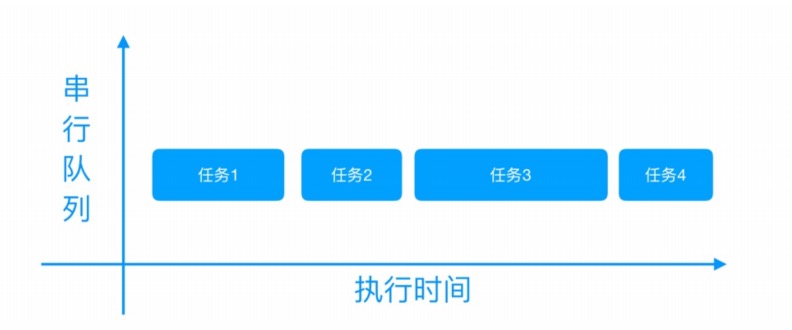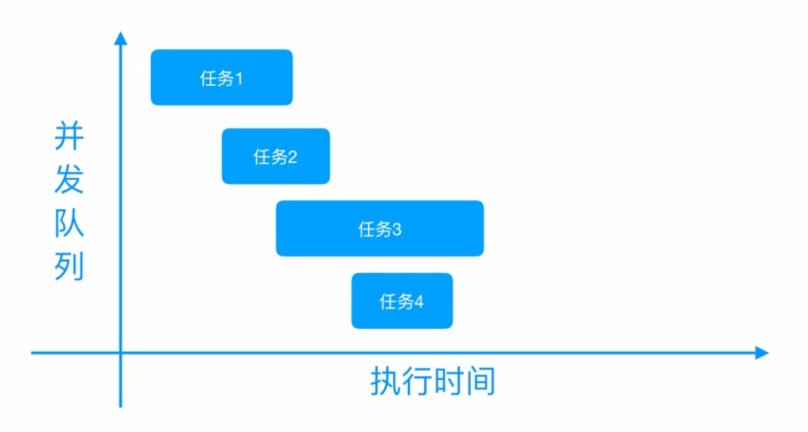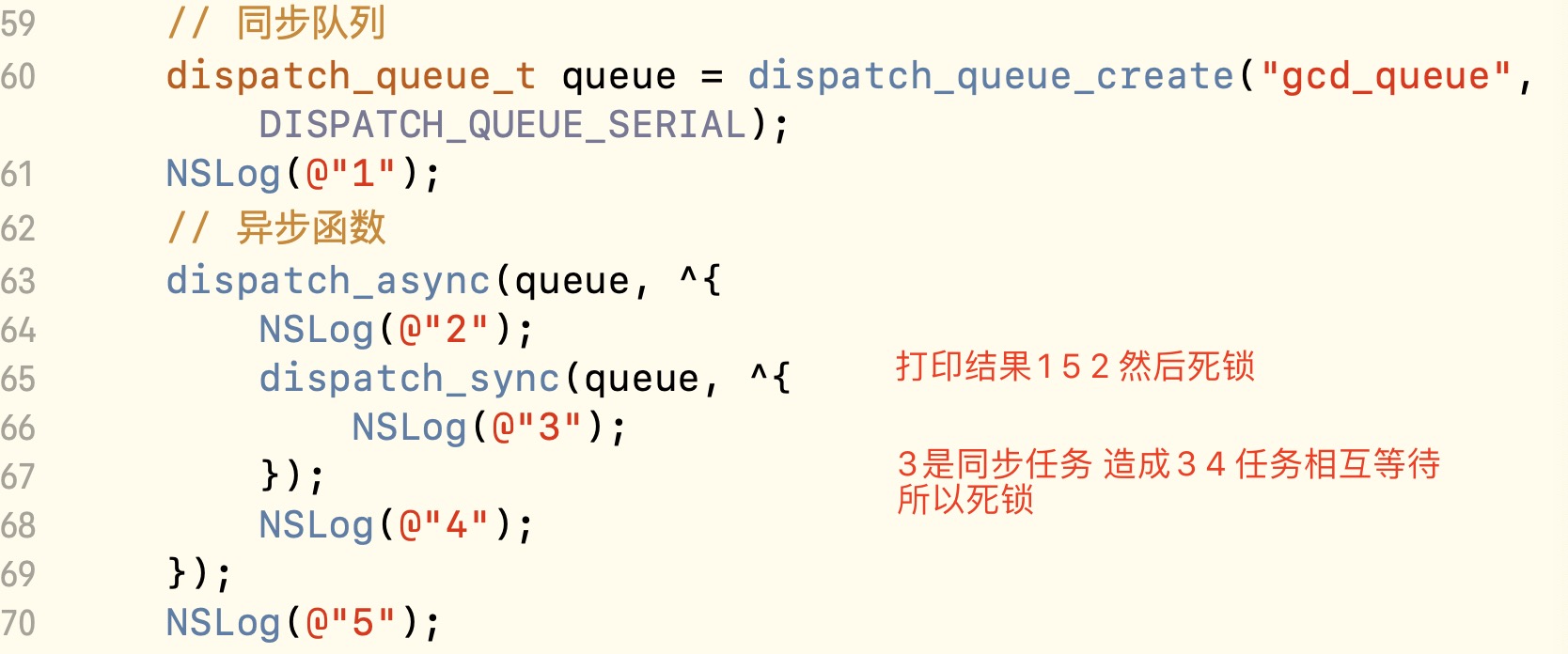1. Introduction
1. What is GCD?
- The full name is Grand Central Dispatch
- Pure C language provides many powerful functions
2. Advantages of GCD
- GCD is Apple's solution for multi-core parallel computing
- GCD will automatically utilize more CPU cores (such as dual core and quad core)
- GCD automatically manages the life cycle of a thread (create thread, schedule task, destroy thread)
- Programmers only need to tell GCD what tasks they want to perform, and they don't need to write any thread management code
2. Tasks and queues
1. Task
- Tasks are encapsulated with block
- The block of the task has no parameters and no return value
1. Synchronization task
- Function: dispatch_sync
- You must wait for the current statement to complete before executing the next statement
- Thread will not be opened
- Perform block tasks at the current time
2. Asynchronous task
- Asynchronous dispatch_async
- You can execute the next statement without waiting for the current statement to finish executing
- Will start the thread to execute the block task
- Asynchrony is synonymous with multithreading
2. Queue
1. Serial queue
- one by one;

2. Concurrent queue
- Tasks are executed randomly without waiting, CPU scheduling

3. Main line
- Function: dispatch_get_main_queue();
- Special serial queue
- Queues dedicated to scheduling tasks on the main thread
- Thread will not be opened
- If the current main thread is executing a task, no matter what task is currently added in the main queue, it will not be scheduled
4. Global queue
- Function: dispatch_get_global_queue(0,0);
- For the convenience of programmers, apple provides a global queue
- Global queue is a concurrent queue
- When using multithreaded development, if there is no special requirement for queues, global queues can be used directly when performing asynchronous tasks
5. Queue and task matching
- Synchronous serial queue: do not start new thread, execute task serially;
- Synchronous concurrent queue: do not start new thread, execute task serially;
- Synchronous main queue: if it is called in the main thread, it will cause deadlock; if it is called in other threads, it will not open a new thread, and it will execute serially, and it will execute tasks serially in the main thread;
- Asynchronous serial queue: start a new thread and execute tasks serially;
- Asynchronous concurrent queue: start a new thread and execute tasks concurrently;
- Asynchronous main queue: do not start a new thread, and execute tasks in the main thread serially
- Deadlock:

2.GCD source code analysis
First, I made a libdispatch source code!
1. Code to create the queue
dispatch_queue_t queue = dispatch_queue_create("gcd_queue", DISPATCH_QUEUE_SERIAL);
//Here we press and hold command, Jump to Definition to jump to the following:
dispatch_queue_t
dispatch_queue_create(const char *_Nullable label,
dispatch_queue_attr_t _Nullable attr);
//Only here
-
We can only go to libdispatch source code to see!
-
Here is the process of our source code search:
-
Search for dispatch_queue_create

-
Search_ dispatch_lane_create_with_target:
//Finally came to the core code!!!! //In the following code, dqai is obtained according to the parameter dqa. The judgment of the following processes is all related to the dispatch_queue_attr_info_t dqai related //So, dispatch_queue_attr_t dqa is also the object we need to study //You can skip this code piece, first look at dqa related things, and then come back to see the following code, can make you clearer!!!! static dispatch_queue_t _dispatch_lane_create_with_target(const char *label, dispatch_queue_attr_t dqa, dispatch_queue_t tq, bool legacy) { //Determine a temporary variable for the following code dispatch_queue_attr_info_t dqai = _dispatch_queue_attr_to_info(dqa); //Priority DISPATCH_QOS_USER_INITIATED and DISPATCH_QOS_BACKGROUND dispatch_qos_t qos = dqai.dqai_qos; #if !HAVE_PTHREAD_WORKQUEUE_QOS if (qos == DISPATCH_QOS_USER_INTERACTIVE) { dqai.dqai_qos = qos = DISPATCH_QOS_USER_INITIATED; } if (qos == DISPATCH_QOS_MAINTENANCE) { dqai.dqai_qos = qos = DISPATCH_QOS_BACKGROUND; } #endif // !HAVE_PTHREAD_WORKQUEUE_QOS //We don't care within the asterisk //*************************************************************** _dispatch_queue_attr_overcommit_t overcommit = dqai.dqai_overcommit; if (overcommit != _dispatch_queue_attr_overcommit_unspecified && tq) { if (tq->do_targetq) { DISPATCH_CLIENT_CRASH(tq, "Cannot specify both overcommit and " "a non-global target queue"); } } if (tq && dx_type(tq) == DISPATCH_QUEUE_GLOBAL_ROOT_TYPE) { // Handle discrepancies between attr and target queue, attributes win if (overcommit == _dispatch_queue_attr_overcommit_unspecified) { if (tq->dq_priority & DISPATCH_PRIORITY_FLAG_OVERCOMMIT) { overcommit = _dispatch_queue_attr_overcommit_enabled; } else { overcommit = _dispatch_queue_attr_overcommit_disabled; } } if (qos == DISPATCH_QOS_UNSPECIFIED) { qos = _dispatch_priority_qos(tq->dq_priority); } tq = NULL; } else if (tq && !tq->do_targetq) { // target is a pthread or runloop root queue, setting QoS or overcommit // is disallowed if (overcommit != _dispatch_queue_attr_overcommit_unspecified) { DISPATCH_CLIENT_CRASH(tq, "Cannot specify an overcommit attribute " "and use this kind of target queue"); } } else { if (overcommit == _dispatch_queue_attr_overcommit_unspecified) { // Serial queues default to overcommit! overcommit = dqai.dqai_concurrent ? _dispatch_queue_attr_overcommit_disabled : _dispatch_queue_attr_overcommit_enabled; } } //*************************************************************** if (!tq) { // The first parameter qos is 4 //The second parameter overcommit is 0 at the same time and 1 in the serial /*_dispatch_get_root_queue(dispatch_qos_t qos, bool overcommit) { if (unlikely(qos < DISPATCH_QOS_MIN || qos > DISPATCH_QOS_MAX)) { DISPATCH_CLIENT_CRASH(qos, "Corrupted priority"); } // 4-1= 3 // The return value is 2 * 3 + 0 / 1 = 6 / 7 return &_dispatch_root_queues[2 * (qos - 1) + overcommit]; } _dispatch_root_queues Method definition: take the address of 6 / 7 in the following table from the array extern struct dispatch_queue_global_s _dispatch_root_queues[]; struct dispatch_queue_global_s _dispatch_root_queues[] = { #define _DISPATCH_ROOT_QUEUE_IDX(n, flags) \ ((flags & DISPATCH_PRIORITY_FLAG_OVERCOMMIT) ? \ DISPATCH_ROOT_QUEUE_IDX_##n##_QOS_OVERCOMMIT : \ DISPATCH_ROOT_QUEUE_IDX_##n##_QOS) #define _DISPATCH_ROOT_QUEUE_ENTRY(n, flags, ...) \ [_DISPATCH_ROOT_QUEUE_IDX(n, flags)] = { \ DISPATCH_GLOBAL_OBJECT_HEADER(queue_global), \ .dq_state = DISPATCH_ROOT_QUEUE_STATE_INIT_VALUE, \ .do_ctxt = _dispatch_root_queue_ctxt(_DISPATCH_ROOT_QUEUE_IDX(n, flags)), \ .dq_atomic_flags = DQF_WIDTH(DISPATCH_QUEUE_WIDTH_POOL), \ .dq_priority = flags | ((flags & DISPATCH_PRIORITY_FLAG_FALLBACK) ? \ _dispatch_priority_make_fallback(DISPATCH_QOS_##n) : \ _dispatch_priority_make(DISPATCH_QOS_##n, 0)), \ __VA_ARGS__ \ } _DISPATCH_ROOT_QUEUE_ENTRY(MAINTENANCE, 0, .dq_label = "com.apple.root.maintenance-qos", .dq_serialnum = 4, ), _DISPATCH_ROOT_QUEUE_ENTRY(MAINTENANCE, DISPATCH_PRIORITY_FLAG_OVERCOMMIT, .dq_label = "com.apple.root.maintenance-qos.overcommit", .dq_serialnum = 5, ), _DISPATCH_ROOT_QUEUE_ENTRY(BACKGROUND, 0, .dq_label = "com.apple.root.background-qos", .dq_serialnum = 6, ), _DISPATCH_ROOT_QUEUE_ENTRY(BACKGROUND, DISPATCH_PRIORITY_FLAG_OVERCOMMIT, .dq_label = "com.apple.root.background-qos.overcommit", .dq_serialnum = 7, ), _DISPATCH_ROOT_QUEUE_ENTRY(UTILITY, 0, .dq_label = "com.apple.root.utility-qos", .dq_serialnum = 8, ), _DISPATCH_ROOT_QUEUE_ENTRY(UTILITY, DISPATCH_PRIORITY_FLAG_OVERCOMMIT, .dq_label = "com.apple.root.utility-qos.overcommit", .dq_serialnum = 9, ), _DISPATCH_ROOT_QUEUE_ENTRY(DEFAULT, DISPATCH_PRIORITY_FLAG_FALLBACK, .dq_label = "com.apple.root.default-qos", .dq_serialnum = 10, ), _DISPATCH_ROOT_QUEUE_ENTRY(DEFAULT, DISPATCH_PRIORITY_FLAG_FALLBACK | DISPATCH_PRIORITY_FLAG_OVERCOMMIT, .dq_label = "com.apple.root.default-qos.overcommit", .dq_serialnum = 11, ), _DISPATCH_ROOT_QUEUE_ENTRY(USER_INITIATED, 0, .dq_label = "com.apple.root.user-initiated-qos", .dq_serialnum = 12, ), _DISPATCH_ROOT_QUEUE_ENTRY(USER_INITIATED, DISPATCH_PRIORITY_FLAG_OVERCOMMIT, .dq_label = "com.apple.root.user-initiated-qos.overcommit", .dq_serialnum = 13, ), _DISPATCH_ROOT_QUEUE_ENTRY(USER_INTERACTIVE, 0, .dq_label = "com.apple.root.user-interactive-qos", .dq_serialnum = 14, ), _DISPATCH_ROOT_QUEUE_ENTRY(USER_INTERACTIVE, DISPATCH_PRIORITY_FLAG_OVERCOMMIT, .dq_label = "com.apple.root.user-interactive-qos.overcommit", .dq_serialnum = 15, ), }; The return value is the value of tq _DISPATCH_ROOT_QUEUE_ENTRY(DEFAULT, DISPATCH_PRIORITY_FLAG_FALLBACK, .dq_label = "com.apple.root.default-qos", .dq_serialnum = 10, ), _DISPATCH_ROOT_QUEUE_ENTRY(DEFAULT, DISPATCH_PRIORITY_FLAG_FALLBACK | DISPATCH_PRIORITY_FLAG_OVERCOMMIT, .dq_label = "com.apple.root.default-qos.overcommit", .dq_serialnum = 11, ), */ //The creation of tq template tq = _dispatch_get_root_queue( qos == DISPATCH_QOS_UNSPECIFIED ? DISPATCH_QOS_DEFAULT : qos, overcommit == _dispatch_queue_attr_overcommit_enabled)->_as_dq; // 0 1 if (unlikely(!tq)) { DISPATCH_CLIENT_CRASH(qos, "Invalid queue attribute"); } } if (legacy) { // if any of these attributes is specified, use non legacy classes if (dqai.dqai_inactive || dqai.dqai_autorelease_frequency) { legacy = false; } } const void *vtable; dispatch_queue_flags_t dqf = legacy ? DQF_MUTABLE : 0; // adopt dqai.dqai_concurrent to distinguish between concurrent and serial if (dqai.dqai_concurrent) { //Concurrent vtable = DISPATCH_VTABLE(queue_concurrent); } else { //serial vtable = DISPATCH_VTABLE(queue_serial); } switch (dqai.dqai_autorelease_frequency) { case DISPATCH_AUTORELEASE_FREQUENCY_NEVER: dqf |= DQF_AUTORELEASE_NEVER; break; case DISPATCH_AUTORELEASE_FREQUENCY_WORK_ITEM: dqf |= DQF_AUTORELEASE_ALWAYS; break; } if (label) { const char *tmp = _dispatch_strdup_if_mutable(label); if (tmp != label) { dqf |= DQF_LABEL_NEEDS_FREE; label = tmp; } } // Open memory - generate response object queue dispatch_lane_t dq = _dispatch_object_alloc(vtable, sizeof(struct dispatch_lane_s)); /* Consortium: typedef union { struct _os_object_s *_os_obj; struct dispatch_object_s *_do; struct dispatch_queue_s *_dq; struct dispatch_queue_attr_s *_dqa; struct dispatch_group_s *_dg; struct dispatch_source_s *_ds; struct dispatch_mach_s *_dm; struct dispatch_mach_msg_s *_dmsg; struct dispatch_semaphore_s *_dsema; struct dispatch_data_s *_ddata; struct dispatch_io_s *_dchannel; } dispatch_object_t DISPATCH_TRANSPARENT_UNION; */ //_dispatch_queue_init(dispatch_queue_class_t dqu, dispatch_queue_flags_t dqf, uint16_t width, uint64_t initial_state_bits) // uint16_t width: dqai.dqai_concurrent ?DISPATCH_QUEUE_WIDTH_MAX : 1 //If it is a concurrent queue width, it is sent to DISPATCH_QUEUE_WIDTH_MAX, serial queue width 1 //Several macro definitions: //#define DISPATCH_QUEUE_WIDTH_FULL 0x1000ull //#define DISPATCH_QUEUE_WIDTH_POOL (DISPATCH_QUEUE_WIDTH_FULL - 1) this is for queue_global use //#define DISPATCH_QUEUE_WIDTH_MAX (DISPATCH_QUEUE_WIDTH_FULL - 2) concurrent queue usage // Construction method: _dispatch_queue_init(dq, dqf, dqai.dqai_concurrent ?DISPATCH_QUEUE_WIDTH_MAX : 1, DISPATCH_QUEUE_ROLE_INNER | (dqai.dqai_inactive ? DISPATCH_QUEUE_INACTIVE : 0)); // label dq->dq_label = label; // priority dq->dq_priority = _dispatch_priority_make((dispatch_qos_t)dqai.dqai_qos, dqai.dqai_relpri); if (overcommit == _dispatch_queue_attr_overcommit_enabled) { dq->dq_priority |= DISPATCH_PRIORITY_FLAG_OVERCOMMIT; } if (!dqai.dqai_inactive) { _dispatch_queue_priority_inherit_from_target(dq, tq); _dispatch_lane_inherit_wlh_from_target(dq, tq); } _dispatch_retain(tq); dq->do_targetq = tq; _dispatch_object_debug(dq, "%s", __func__); return _dispatch_trace_queue_create(dq)._dq; } -
Search_ dispatch_queue_attr_to_info (know from above that this should be a struct type) and dispatch_queue_attr_info_t
typedef struct dispatch_queue_attr_info_s { dispatch_qos_t dqai_qos : 8; int dqai_relpri : 8; uint16_t dqai_overcommit:2; uint16_t dqai_autorelease_frequency:2; uint16_t dqai_concurrent:1; uint16_t dqai_inactive:1; } dispatch_queue_attr_info_t; dispatch_queue_attr_info_t _dispatch_queue_attr_to_info(dispatch_queue_attr_t dqa) { //Create a new dqai structure dispatch_queue_attr_info_t dqai = { }; //Judge whether dqa exists or not, and return directly if it does not exist, //Directly return to????? //What is the value of our serial queue? //#define DISPATCH_QUEUE_SERIAL NULL //NULL is passed in, so a NULL structure is returned here if (!dqa) return dqai; //If it is not a serial queue, assign the following dqai structure #if DISPATCH_VARIANT_STATIC if (dqa == &_dispatch_queue_attr_concurrent) { dqai.dqai_concurrent = true; return dqai; } #endif if (dqa < _dispatch_queue_attrs || dqa >= &_dispatch_queue_attrs[DISPATCH_QUEUE_ATTR_COUNT]) { DISPATCH_CLIENT_CRASH(dqa->do_vtable, "Invalid queue attribute"); } // Apple's algorithm size_t idx = (size_t)(dqa - _dispatch_queue_attrs); // Bitfield // 0000 000000000 00000000000 0000 000 1 //Assignment of dqa structural body field dqai.dqai_inactive = (idx % DISPATCH_QUEUE_ATTR_INACTIVE_COUNT); idx /= DISPATCH_QUEUE_ATTR_INACTIVE_COUNT; dqai.dqai_concurrent = !(idx % DISPATCH_QUEUE_ATTR_CONCURRENCY_COUNT); idx /= DISPATCH_QUEUE_ATTR_CONCURRENCY_COUNT; dqai.dqai_relpri = -(idx % DISPATCH_QUEUE_ATTR_PRIO_COUNT); idx /= DISPATCH_QUEUE_ATTR_PRIO_COUNT; dqai.dqai_qos = idx % DISPATCH_QUEUE_ATTR_QOS_COUNT; idx /= DISPATCH_QUEUE_ATTR_QOS_COUNT; dqai.dqai_autorelease_frequency = idx % DISPATCH_QUEUE_ATTR_AUTORELEASE_FREQUENCY_COUNT; idx /= DISPATCH_QUEUE_ATTR_AUTORELEASE_FREQUENCY_COUNT; dqai.dqai_overcommit = idx % DISPATCH_QUEUE_ATTR_OVERCOMMIT_COUNT; idx /= DISPATCH_QUEUE_ATTR_OVERCOMMIT_COUNT; return dqai; } //After that, let's go back to the top_ dispatch_lane_create_with_target code to continue to analyze!!!!
2. Creation of main queue and global queue
1.dispatch_get_global_queue(0, 0)
dispatch_queue_global_t
dispatch_get_global_queue(long identifier, unsigned long flags);
typedef struct dispatch_queue_global_s *dispatch_queue_global_t;
struct dispatch_queue_global_s _dispatch_root_queues[] = {
#define _DISPATCH_ROOT_QUEUE_IDX(n, flags) \
((flags & DISPATCH_PRIORITY_FLAG_OVERCOMMIT) ? \
DISPATCH_ROOT_QUEUE_IDX_##n##_QOS_OVERCOMMIT : \
DISPATCH_ROOT_QUEUE_IDX_##n##_QOS)
#define _DISPATCH_ROOT_QUEUE_ENTRY(n, flags, ...) \
[_DISPATCH_ROOT_QUEUE_IDX(n, flags)] = { \
DISPATCH_GLOBAL_OBJECT_HEADER(queue_global), \
.dq_state = DISPATCH_ROOT_QUEUE_STATE_INIT_VALUE, \
.do_ctxt = _dispatch_root_queue_ctxt(_DISPATCH_ROOT_QUEUE_IDX(n, flags)), \
.dq_atomic_flags = DQF_WIDTH(DISPATCH_QUEUE_WIDTH_POOL), \
.dq_priority = flags | ((flags & DISPATCH_PRIORITY_FLAG_FALLBACK) ? \
_dispatch_priority_make_fallback(DISPATCH_QOS_##n) : \
_dispatch_priority_make(DISPATCH_QOS_##n, 0)), \
__VA_ARGS__ \
}
_DISPATCH_ROOT_QUEUE_ENTRY(MAINTENANCE, 0,
.dq_label = "com.apple.root.maintenance-qos",
.dq_serialnum = 4,
),
_DISPATCH_ROOT_QUEUE_ENTRY(MAINTENANCE, DISPATCH_PRIORITY_FLAG_OVERCOMMIT,
.dq_label = "com.apple.root.maintenance-qos.overcommit",
.dq_serialnum = 5,
),
_DISPATCH_ROOT_QUEUE_ENTRY(BACKGROUND, 0,
.dq_label = "com.apple.root.background-qos",
.dq_serialnum = 6,
),
_DISPATCH_ROOT_QUEUE_ENTRY(BACKGROUND, DISPATCH_PRIORITY_FLAG_OVERCOMMIT,
.dq_label = "com.apple.root.background-qos.overcommit",
.dq_serialnum = 7,
),
_DISPATCH_ROOT_QUEUE_ENTRY(UTILITY, 0,
.dq_label = "com.apple.root.utility-qos",
.dq_serialnum = 8,
),
_DISPATCH_ROOT_QUEUE_ENTRY(UTILITY, DISPATCH_PRIORITY_FLAG_OVERCOMMIT,
.dq_label = "com.apple.root.utility-qos.overcommit",
.dq_serialnum = 9,
),
_DISPATCH_ROOT_QUEUE_ENTRY(DEFAULT, DISPATCH_PRIORITY_FLAG_FALLBACK,
.dq_label = "com.apple.root.default-qos",
.dq_serialnum = 10,
),
_DISPATCH_ROOT_QUEUE_ENTRY(DEFAULT,
DISPATCH_PRIORITY_FLAG_FALLBACK | DISPATCH_PRIORITY_FLAG_OVERCOMMIT,
.dq_label = "com.apple.root.default-qos.overcommit",
.dq_serialnum = 11,
),
_DISPATCH_ROOT_QUEUE_ENTRY(USER_INITIATED, 0,
.dq_label = "com.apple.root.user-initiated-qos",
.dq_serialnum = 12,
),
_DISPATCH_ROOT_QUEUE_ENTRY(USER_INITIATED, DISPATCH_PRIORITY_FLAG_OVERCOMMIT,
.dq_label = "com.apple.root.user-initiated-qos.overcommit",
.dq_serialnum = 13,
),
_DISPATCH_ROOT_QUEUE_ENTRY(USER_INTERACTIVE, 0,
.dq_label = "com.apple.root.user-interactive-qos",
.dq_serialnum = 14,
),
_DISPATCH_ROOT_QUEUE_ENTRY(USER_INTERACTIVE, DISPATCH_PRIORITY_FLAG_OVERCOMMIT,
.dq_label = "com.apple.root.user-interactive-qos.overcommit",
.dq_serialnum = 15,
),
};
//global_ Queues are also created using templates
2.dispatch_get_main_queue()
dispatch_queue_main_t
dispatch_get_main_queue(void)
{
return DISPATCH_GLOBAL_OBJECT(dispatch_queue_main_t, _dispatch_main_q);
}
typedef struct dispatch_queue_static_s *dispatch_queue_main_t;
struct dispatch_queue_static_s _dispatch_main_q = {
DISPATCH_GLOBAL_OBJECT_HEADER(queue_main),
#if !DISPATCH_USE_RESOLVERS
.do_targetq = _dispatch_get_default_queue(true),
#endif
.dq_state = DISPATCH_QUEUE_STATE_INIT_VALUE(1) |
DISPATCH_QUEUE_ROLE_BASE_ANON,
.dq_label = "com.apple.main-thread",
.dq_atomic_flags = DQF_THREAD_BOUND | DQF_WIDTH(1),
.dq_serialnum = 1, //From here we can see that the main queue is a serial queue
};
//struct dispatch_queue_static_s main queue is created using a static
3._ dispatch_ root_ Creation of queues []
-
This creation process loads the dynamic library libdispatch_ Created when dyld
//establish void _dispatch_introspection_init(void) { _dispatch_introspection.debug_queue_inversions = _dispatch_getenv_bool("LIBDISPATCH_DEBUG_QUEUE_INVERSIONS", false); // Hack to determine queue TSD offset from start of pthread structure uintptr_t thread = _dispatch_thread_self(); thread_identifier_info_data_t tiid; mach_msg_type_number_t cnt = THREAD_IDENTIFIER_INFO_COUNT; kern_return_t kr = thread_info(pthread_mach_thread_np((void*)thread), THREAD_IDENTIFIER_INFO, (thread_info_t)&tiid, &cnt); if (!dispatch_assume_zero(kr)) { _dispatch_introspection.thread_queue_offset = (void*)(uintptr_t)tiid.dispatch_qaddr - (void*)thread; } _dispatch_thread_key_create(&dispatch_introspection_key, _dispatch_introspection_thread_remove); _dispatch_introspection_thread_add(); // add main thread //Loop creation_ dispatch_root_queues[i]; for (size_t i = 0; i < DISPATCH_ROOT_QUEUE_COUNT; i++) { _dispatch_trace_queue_create(&_dispatch_root_queues[i]); } #if DISPATCH_USE_MGR_THREAD && DISPATCH_USE_PTHREAD_ROOT_QUEUES _dispatch_trace_queue_create(_dispatch_mgr_q.do_targetq); #endif _dispatch_trace_queue_create(&_dispatch_main_q);//Main queue creation _dispatch_trace_queue_create(&_dispatch_mgr_q); } //Create method static inline dispatch_queue_class_t _dispatch_trace_queue_create(dispatch_queue_class_t dqu) { _dispatch_only_if_ktrace_enabled({ uint64_t dq_label[4] = {0}; // So that we get the right null termination dispatch_queue_t dq = dqu._dq; strncpy((char *)dq_label, (char *)dq->dq_label ?: "", sizeof(dq_label)); _dispatch_ktrace2(DISPATCH_QOS_TRACE_queue_creation_start, dq->dq_serialnum, _dispatch_priority_to_pp_prefer_fallback(dq->dq_priority)); _dispatch_ktrace4(DISPATCH_QOS_TRACE_queue_creation_end, dq_label[0], dq_label[1], dq_label[2], dq_label[3]); }); return _dispatch_introspection_queue_create(dqu); } -
The main queue is created separately during initialization, and is not used_ dispatch_root_queues [] template creation! Others are created through_ dispatch_root_queues [] create